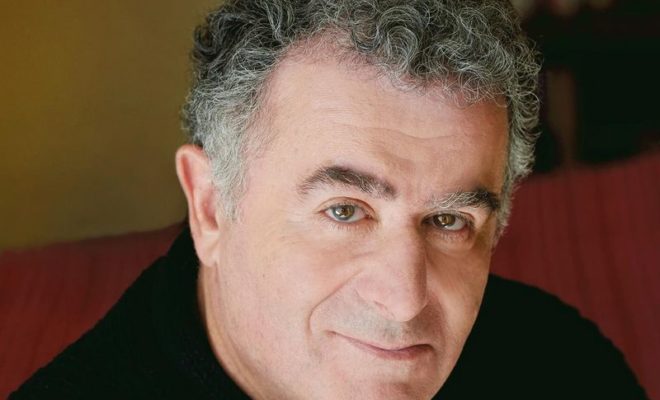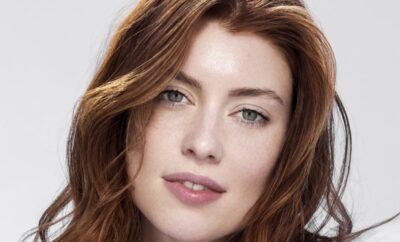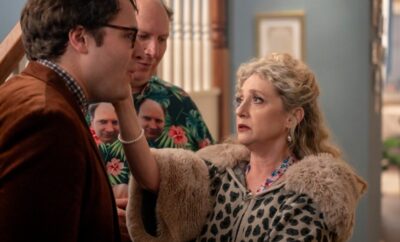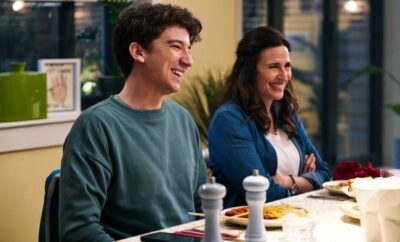
Interviews
Saul Rubinek – Hunters
By: Jamie Steinberg
Q) What are the recent projects that you are working on?
A) Recently I’ve been writing a new play. It’s my second play as a playwright. A few years ago my first play “Terrible Advice” was performed in London, directed by Frank Oz with a great cast including Sharon Horgan and Scott Bakula. That play was also translated into German and played in Berlin, which was a thrill for me, because I was born in a refugee camp in Germany. My new play, “All In the Telling,” has to do with my parents being survivors of the Holocaust, and how that affected three generations of my family. In 1986, I produced a documentary and took my parents back to Poland to have a reunion with the farmers that hid them during the war. That documentary was called So Many Miracles, and I wrote a book about my parents experiences with the same title. My new play is about how that book and documentary came to be and also how my wife Elinor and I introduced the subject of the Holocaust to my children. The writing of that play has occupied the last two years of my life and this fall I was finally able to complete it. I guess I was able to break through because I recently acted in a play — I was a playwright, but as an actor I haven’t done a play in many, many years. I was a stage actor from the age of seven to the age of forty-three, but my acting life since then has been television and film. After I worked on the Coen Brothers movie The Ballad of Buster Scruggs a few years ago, Ethan Coen asked me to act in a new play of his called “A Play Is A Poem.” It was a co-production between Los Angeles’ Center Theatre Group and New York’s Atlantic Theatre Company (which is run by Neil Pepe). Neil Pepe directed the play, which is comprised of five one-act plays. It played last fall at the Mark Taper Forum and I’m going to be doing it again at the Atlantic Theatre off-Broadway in New York in the Spring. Doing that play helped me go back to writing my own play. Also, because I shot the series “Hunters” in New York for six months, I saw a lot of theater, and that inspired me to finish writing my new play.
Q) How did you become a part of the new series “Hunters?”
A) The way actors normally do – I I read the pilot script. Of course the character, Murray Markowitz, was personally relevant to me because he is a Holocaust survivor. Murray would have the kind of accent that my father had, because he was from the same city in Poland that my father was from – Lodz. So I was going to be playing a Polish Jew who now lived in the United States but grew up in Poland. I knew a lot about the subject and I related very strongly to it. Also, like my character in Hunters, my first language was Yiddish. I grew up in an area of Montreal that was full of Jewish immigrants, many of whom were Holocaust survivors. It was also an area of working class French Canadians. So I grew up speaking a strange mixture of French street slang and Yiddish before I learned how to speak English. My ability to speak Yiddish helped me a lot to identify with the role of Murray. It was really almost like I was born to play him.
Q) Since the material is so dark and hits so close to home, were you at all hesitant to work on the show?
A) I wouldn’t say I was hesitant. I would say I was inspired by it the series has a very unique take on the subject. It’s dark and violent, but it also has a comic book aspect to it which is oddly humorous, and the series has a kind of ironic superhero twist on the characters. David Weil, the creator of the show, had a grandmother who was a survivor and she told him about these stories when he was young. So his view as a kid had a kind of a comic book feel to them. He found a way to translate his youthful take on that into the writing of the script. So, it was inspiring to do something really fresh and had an original take on it. I think I might have been hesitant had it simply been a series about Jewish vigilantes killing Nazis. That’s just not what it is. The hunters are not all Jewish and not all the hunters are directly related to the Holocaust — they have their own unique reasons for being part of the hunt. The series profoundly deals with the consequences of using violence as retribution. It isn’t a simple adventure-revenge series. It uses techniques that are as varied as the realism of Schindler’s List, the violence of Tarantino’s Inglorious Bastards and the humor of Life is Beautiful. The series uses many different and original techniques to tell the story. I was instantly inspired to be part of it.
Q) Since you are so knowledgeable about this subject matter, were you asked to consult at all?
A). The series had hired someone helped the actors who had to speak Yiddish, or German, or Polish – and I was able to help with some of the Yiddish translation and pronunciation. The subject matter of the series was, obviously, a conversation I had with the creator, David, all the time. There were things that were going on in the show that were familiar to me either because a relative had gone through it (I had relatives that were in the camps) or I had a story to tell about my family background. I told David, the creator of the show, some of these family and it’s not that he would use the stories directly into the series, but it certainly affected his view of my character. He was dealing with his own family history, and so was I. Many people who have had big traumas in their lives, no matter their nationality, have to deal with what their parents or grandparents and ho the consequences of those big events resonate in their own lives and in their children’s lives.
Q Talk about working with the incredible cast that was assembled.
A) It was really a highlight in my career to play the role and to work with such extraordinary group of people, not only the extraordinary opportunity to work with Al Pacino, who is an actor’s actor, but to work with Carol Kane who plays my wife Mindy. I’d never met her before, oddly. I first saw her many years ago in Hester Street — a role she performed completely in Yiddish — she was nominated for an Academy Award for best actress when she was 22 years old. So, it was great to meet her and work with her as well as the other extraordinary people who were in that cast.
Q) Going into the series were you looking forward to share a scene with anyone in particular?
A) It was specifically exciting for me to work with my daughter who was playing my daughter. When she was cast, she ended up in three episodes and I was able to do scenes with her. You can imagine that was really exciting for me.
Q) What were some of your favorite scenes to film?
A) It was very emotional and special. I can’t reveal too much or Amazon will come to my house and take me away. [laughs] But the scenes that I did with my daughter (when you see them, they start in the sixth episode) are very particular. They are very special and although they have great joy in them, they also have great trauma in them for reasons that I can’t reveal. So, they were very emotional scenes on a character level and very emotional scenes on a personal level because it was my daughter that I was working with.
Q) What do you hope viewers take away from watching “Hunters?”
A) That’s a difficult question. I hope it’s massively entertaining. The series explores exploration something that really did happen, called Operation Paperclip, by the American government right after world war two. The government brought people to live and work in the US who they knew were Nazis. They hid their backgrounds and used them for whatever purposes (political, scientific, etc. – whatever they needed to do). This series takes an imaginative leap from that true thing. it’s about the Nazis’ plans in America for a Fourth Reich. Really, I think that Hunters is depressingly apt – there is a huge and terrifying growth of right-wing nationalism throughout the world. y. There is a growth of terrible fear of otherness, whether the otherness is because somebody is not your color, your religion, race, immigrants. There is growing sympathy for that kind of terrifying philosophy. The series is deals with what concept of otherness can lead to — genocide. The show finds, I think, an extraordinary, entertaining, violent, funny and character-driven way of dealing with this very complicated subject. It isn’t a black and white situation of good guys and bad guys. There are definitely bad guys here. The Nazis are bad guys. I’m not going to say that there are good people on both sides. .[chuckles] What I mean is one of the main themes is that there are dark consequences in the way we deal with evil. When you look into a dark abyss, it looks right back at you.
Q) Will you sit down as a family to watch the show?
A) Definitely. We’re all into it together. We plan to watch it together. I’m told there is going to be a premiere before it drops on Amazon on February 21st. There will be a premiere in Los Angeles and Amazon is going to show the pilot. We’ll watch it together then for the first time. I haven’t seen anything except the scenes that I was looping, so I’ve seen very, very little of it. We hope to all watch it as a family together. It will be a family event.
Q) You have been a part of a number of incredible projects. What have been some of your favorite films and/or series to have worked on?
A) A highlight of my career recently (over the last ten years anyway) was that I had the great good fortune to play Artie on “Warehouse 13.” It was really fun and I had a really wonderful showrunner in Jack Kenny, who was a gift. Not only the writers in his room, but also the cast. That was very, very fortunate. I got to shoot it in my old hometown in Toronto, which was really cool. And I had a great role for five years so that was really wonderful. Then, getting to work on The Ballad of Buster Scruggs with the Coen brothers who are filmmakers that I have admired for a long, long time. Being in an old stagecoach with that wonderful group of actors (almost doing like a one-act play) was really a highlight. And doing Ethan’s one-act plays that I just did was extraordinary. But going back in my life, I have to look at Unforgiven as a great project that I was thrilled to be a part of. There have been projects throughout there years – there have been so many of them. Those are huge highlights in my career. Doing True Romance was a great experience. And because I went to a screening of Once Upon a Time in Hollywood, I got to meet Tarantino, who wrote True Romance, for the first time. I also just recently met Eli Roth. Eli Roth plays a character named “The Bear” in Ingolorious Bastards — his character’s last name is Donowitz. My character in True Romance is Lee Donowitz — so in the Tarantino universe, Eli is my father. So, I got to meet my Tarantino movie-world dad.
Q) We absolutely loved you on “Warehouse 13!” What did you personally take away from your time on the series, including mementos?
A) A lot! My biggest memento from that series is that the show-runner Jack Kenny became a very close friend who doesn’t live very far away from me in Hollywood. So, I see him all the time. He and his husband Michael are friends of our family. That is probably the biggest takeaway — that friendship. We get to share stories of our creative lives and our ups and downs together. It was also the first time that I’d ever played a character for so long. It was a really interesting challenge to do that many hours of a character. I had this conversation with Al Pacino, actually, when we were working on the set. We were talking about people who binge watch, which was not a thing in his youth and certainly not in mine. He said a very interesting thing that I hadn’t thought of. He said, “Given the fact that people might binge watch (as they are going to drop all ten episodes on one day)…” His question to me was, “Knowing that the audience might binge-watch so many episodes in a row, do you think actors should put more variety into their performance?” It’s a very interesting concept because it didn’t exist before a decade ago – the idea that someone might watch a performance for so many hours in a row. I’ve never binge watched “Warehouse 13” and I wonder if I’d like my work – if there was enough variety in my work to warrant a binge watch. [chuckles] But what was great is I had a wonderful cast of people to work with and we had great, great scripts. At that point in my career, to have the great fortune of having a role like that (that had so much variety) was a wonderful thing. The only other time that I had a role that went on for a while (two or two and a half years) was the role I played on “Frasier.” That was certainly a highlight for me – working with that group of people. Even now we watch “Frasier” as a family as kind of a comfort food and it’s kind of a shock like, “Oh wait! That’s me! Oh shit! I forgot I was on that show!” [laughs]
Q) What would like to say to everyone who is a fan and supporter of you and the work you do?
A) Thanks! I’m just grateful for people who follow my work and I’m humbled by it. For me, when I look back, I just feel extremely lucky that I spent my life doing something that I loved and I had the great luck to be able to do that. I continue to do it. I’ve directed four films, two of them produced by my wife Elinor Reid (some of the highlights of my life are the films I directed). But now a lot of my focus is on doing theater again, both as a playwright and as an actor. I’m really excited about the new play I wrote. And it coincidentally has such resonance with the Hunters I’m really excited to see the reaction to “Hunters.” It will be interesting.





You must be logged in to post a comment Login